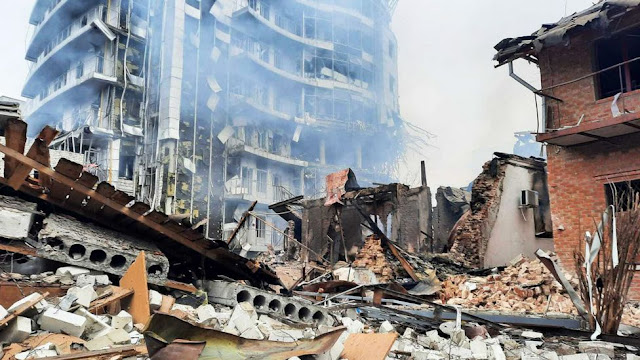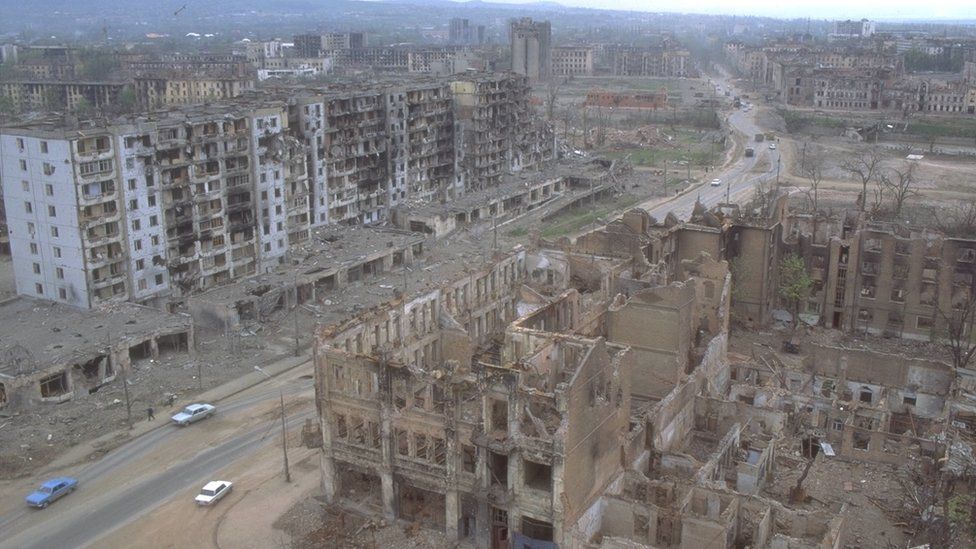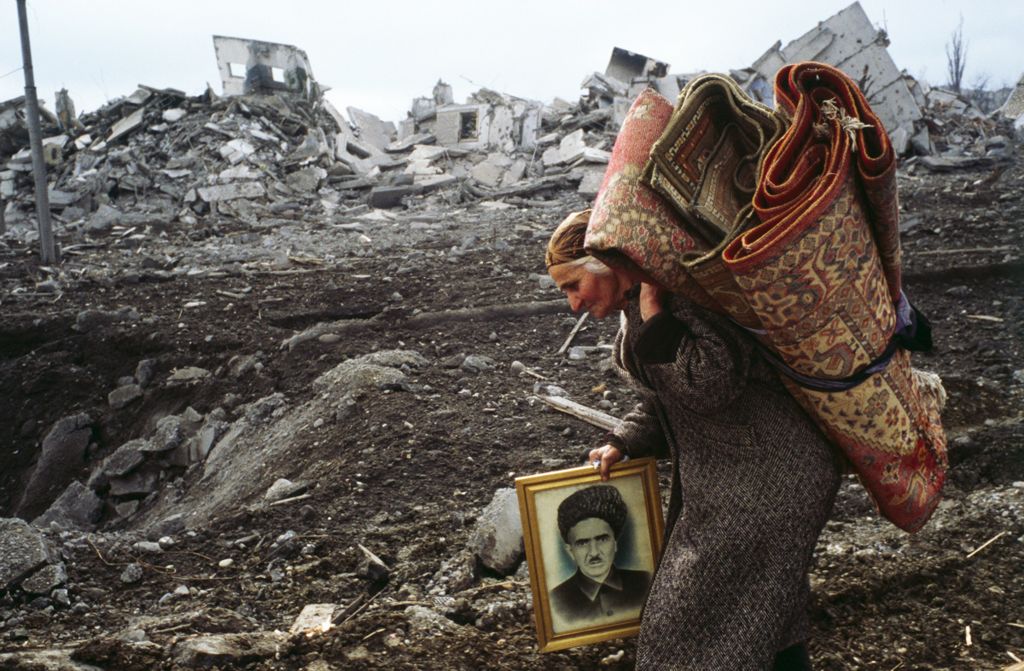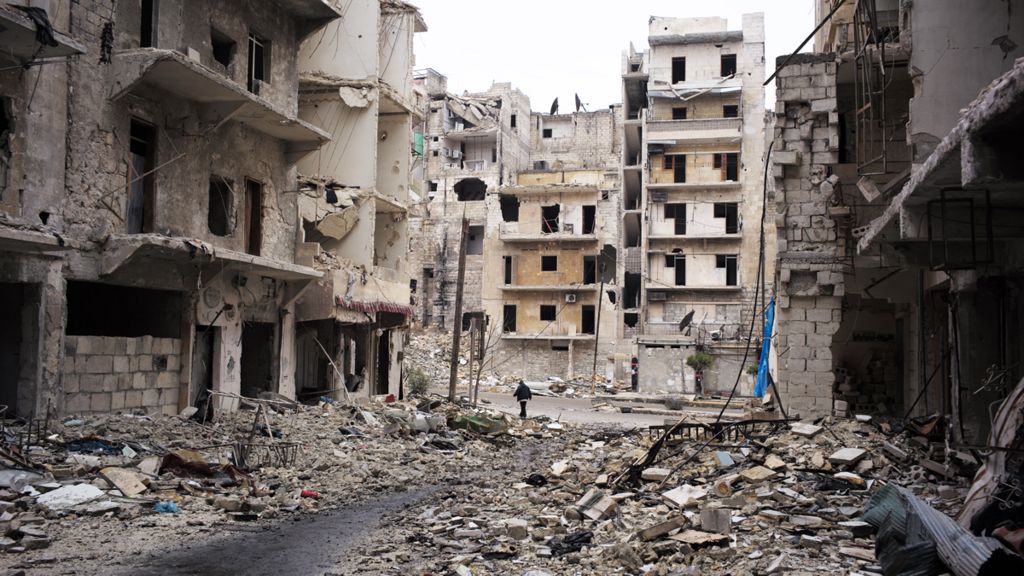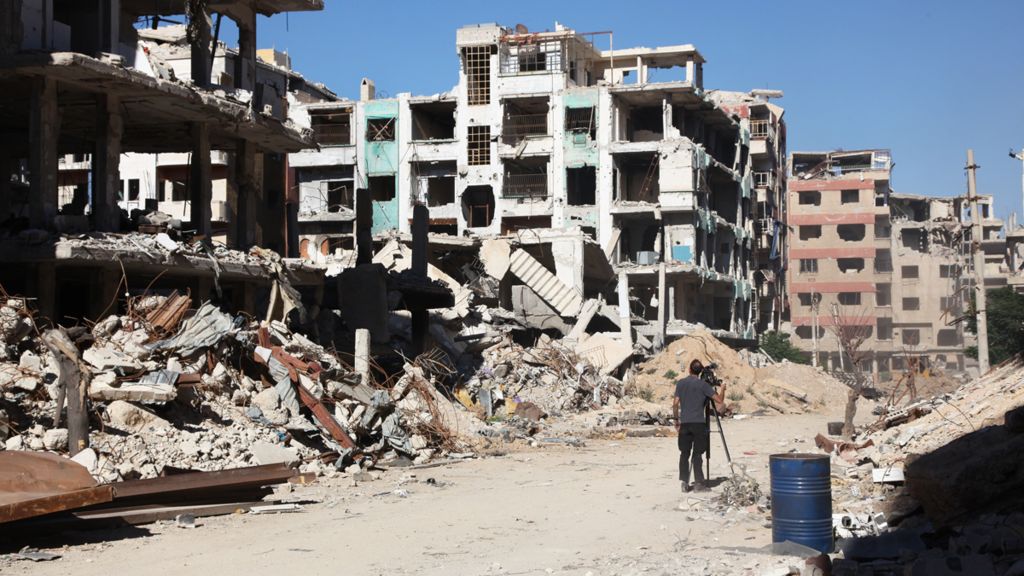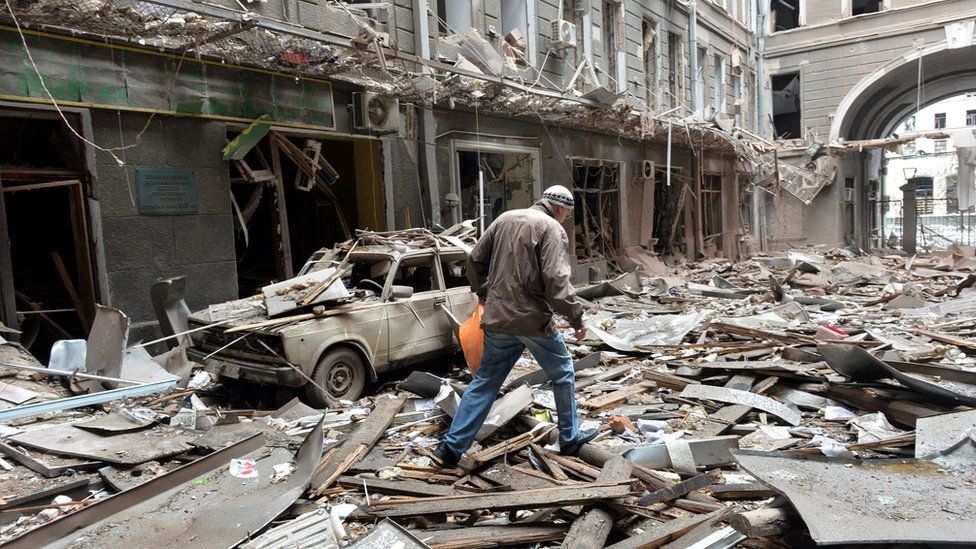BBC News 5 March 2022 - by Jeremy Bowen
As I write this, the centre of Kyiv and much of its suburbs are largely untouched. Sirens and alerts punctuate the day.
Everyone here knows that could change, very quickly. By the time you read this, it might have.
Russia answers resistance with firepower. Rather than send in men to fight from house to house and room to room, their military doctrine calls for a bombardment by heavy weapons and from the air to destroy their enemies.
Kharkiv and the other cities and towns have suffered grievous damage, and as far as we know many civilian casualties. The seat of Kharkiv's local government was badly damaged in a missile strike that was filmed. Russian President Vladimir Putin might be sending a message to Kyiv - look to the east, because this could happen to you.
The depressing conclusion I've drawn from other wars in which I have seen Russians in action is that it could get much worse.
'The ground was shaking'
So far, Mr Putin has not given the order to inflict the kind of damage that Russian forces brought down on Grozny, when the Russian republic of Chechnya rebelled in the 1990s, and in Syria since Mr Putin intervened in force in 2015.
I covered the first Chechen war when it started in the winter of 1994-1995. Just as in Ukraine, the Russian army made serious military blunders in ground operations. Armoured columns were ambushed by Chechen rebels in narrow streets and destroyed. Many conscript soldiers did not want to fight and die.
Before the invasion of Ukraine, military analysts assessed that Russia's forces were now much more professional. Perhaps they are, but Russia's invasion has once again been slowed by logistical bottlenecks, tactical mistakes and terrified teenagers who had not been told they were going to war - as well as resistance as fierce as anything the Chechens offered in 1995.
In Chechnya, Russia's answer was to use its firepower. In a few weeks, artillery and air strikes reduced the centre of Grozny, a typical concrete and steel Soviet city, to rubble. I was in Minutka Square, a centre of Chechen resistance, on a day when it was hit by repeated air strikes. Civilians were mostly in cellars, risking death every time they went out to find water or food.
In Minutka Square that day, Chechen fighters were killed by cluster bombs, and buildings set on fire. Twenty-four hours later, the entire main avenue of the city was hit by missile strikes and enveloped in smoke and flame. The ground was shaking where we were filming.
Overwhelmed from the air
The most devastated places I have seen in years of war reporting, apart from Grozny, were in Syria. The connection is the destructive power of the Russian military.
Mr Putin's decision to intervene in Syria saved the regime of Bashar al-Assad and took a big step towards his objective of restoring Russia as a world power. Two decisive victories over rebels in Syria, vitally important for the regime, were delivered by the ruthless use of Russian firepower.
The first was in Aleppo at the end of 2016. The eastern side of the city, which had been held by a variety of rebel factions throughout the war, fell after it was pulverised by shelling and air strikes. The Assad regime did not need any encouragement to shell Syrians, but the Russians brought a much greater level of destructive power. Strategic bombers based at home and in Iran delivered devastating strikes.
The tactic used in Syria was to encircle and besiege rebel-held areas, pound them from the air and from artillery batteries, and in the end exhaust the defenders and any civilians who had not managed to escape. Many of them were killed.
When I was able to drive through Eastern Aleppo a few weeks after it fell, destruction went on for mile after mile. I couldn't see a building that was untouched. Entire neighbourhoods were left in ruins. Streets were blocked with mountain ranges of rubble.
I saw the same tactics work in Eastern Ghouta, a string of rebel held towns and farmland on the edge of the Syrian capital. Its capitulation in 2018 was the end of the battle for Damascus, that had looked at first as if it could go the rebels' way. That changed after the US decided in 2013 not to strike the Assad regime when it used chemical weapons in Douma, one of the area's towns. The long fight turned decisively in the regime's favour after Russia entered the war in 2015.
Eastern Ghouta's defenders dug an underground tunnel city to escape the air strikes and shelling. But siege and overwhelming firepower wins battles. That is because defenders get killed and exhausted, and civilians, however defiant, are subjected to such fear and misery that they welcome the respite that surrender brings.
In Kyiv, one of the big questions on everybody's minds is whether they are going to get the treatment meted out not only to Kharkiv, Mariupol and the rest, but also to Chechnya and Syria.
Will the sanctity of Orthodox shrines create the restraint that was absent in attacks on Muslims in Chechnya and Syria? Putin himself has written about Ukraine's significance in Russia's history. Will he be prepared to destroy Ukraine to regain it? If sanctions and Ukrainian resistance threaten his regime's stability, will he take more extreme measures?
The record shows that the Russian military compensates for weaknesses in the capabilities of its ground forces by turning to the big guns. Ukrainians are praying that will not happen here.
